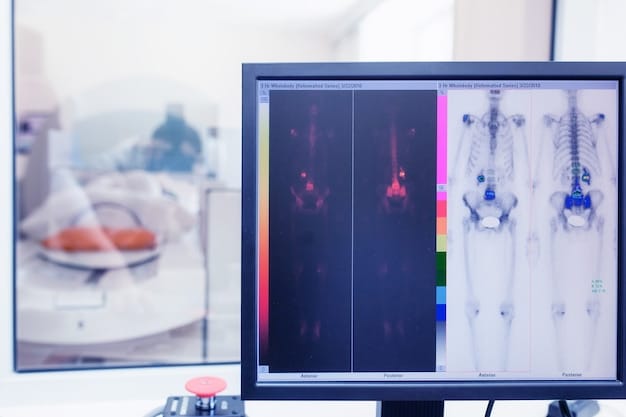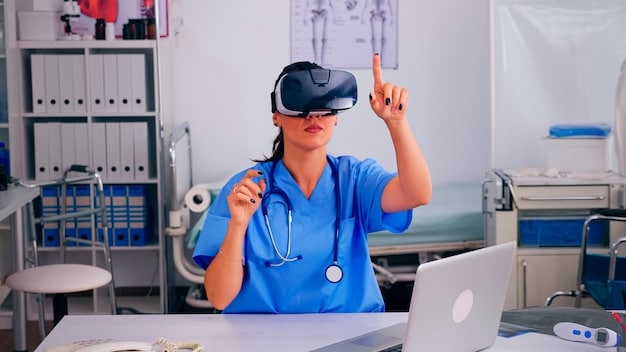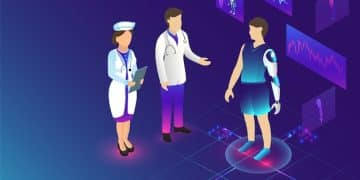AI in US Healthcare: Training Future Medical Professionals

AI in US Healthcare: Training the Next Generation of Medical Professionals focuses on how artificial intelligence is being integrated into medical education in the United States to improve diagnostic accuracy, treatment planning, and patient care through advanced simulation and data analysis.
The landscape of healthcare is rapidly evolving, and artificial intelligence (AI) is at the forefront of this transformation. AI in US Healthcare: Training the Next Generation of Medical Professionals is crucial for ensuring that future healthcare providers are equipped to leverage these advanced technologies effectively, ultimately enhancing patient outcomes and healthcare delivery.
The growing role of AI in healthcare
Artificial intelligence is revolutionizing various sectors, and healthcare is no exception. From improving diagnostic accuracy to streamlining administrative processes, AI’s impact is substantial. For the next generation of medical professionals, understanding and utilizing AI tools is becoming increasingly essential.
AI applications in diagnostics
AI algorithms can analyze medical images, such as X-rays and MRIs, more accurately and quickly than human radiologists. This leads to earlier and more precise diagnoses, which can significantly improve patient outcomes.
AI in treatment planning
AI can assist in creating personalized treatment plans by analyzing patient data and predicting the most effective interventions. This reduces the trial-and-error approach, making treatments more targeted.

AI in drug discovery
AI accelerates the process of identifying and testing new drug candidates, significantly reducing the time and cost associated with bringing new medications to market.
- Enhances Diagnostic Accuracy
- Improves Treatment Efficiency
- Streamlines Administrative Tasks
- Accelerates Drug Discovery
The integration of AI into healthcare promises to make medical practices more efficient, accurate, and patient-centered. Preparing future medical professionals to harness these tools will be critical for fully realizing these benefits.
Curriculum innovation in medical schools
To effectively prepare the next generation of medical professionals, medical schools are beginning to integrate AI training into their curricula. This involves updating existing courses and introducing new ones that focus specifically on AI applications in healthcare.
Integrating AI into existing courses
Many medical schools are incorporating AI modules into their traditional courses like anatomy, physiology, and pharmacology. This helps students understand how AI can enhance their understanding of these foundational subjects.
New courses focusing on AI
Some institutions are introducing dedicated courses that cover AI principles, machine learning, and data science. These courses provide students with a comprehensive understanding of AI technologies and their applications in medicine.
Hands-on training
Practical training is crucial for students to gain confidence in using AI tools. Simulations, case studies, and real-world projects allow students to apply their knowledge and develop practical skills.
Curriculum innovation is essential to keep pace with the rapid advancements in AI. By integrating AI training into medical education, schools can equip students with the skills they need to thrive in a technology-driven healthcare environment.
The role of simulation and virtual reality
Simulation and virtual reality (VR) technologies play a significant role in training medical professionals to use AI tools. These technologies provide a safe and controlled environment for students to practice their skills and experiment with different scenarios.
AI-powered simulations
AI-powered simulations allow students to interact with virtual patients that respond realistically to different treatments and interventions. This provides valuable experience in a risk-free setting.
VR training modules
VR training modules can simulate complex medical procedures and scenarios, allowing students to practice their skills repeatedly until they achieve proficiency. This is particularly useful for rare or high-risk procedures.

Personalized learning
AI can personalize the learning experience by adapting the difficulty and content of simulations based on the student’s performance. This ensures that each student receives the training they need to succeed.
- Safe and Controlled Environment
- Realistic Patient Interactions
- Personalized Learning Paths
Simulation and VR technologies are transforming medical education by providing immersive and interactive learning experiences. The integration of AI into these technologies enhances their effectiveness and prepares students for the challenges of modern healthcare.
Data science and ethical considerations
Data science skills are crucial for medical professionals working with AI. However, it is also important to address the ethical considerations and potential biases that can arise from using AI in healthcare.
Data analysis and interpretation
Medical professionals need to be able to analyze and interpret the data generated by AI algorithms. This requires a solid understanding of statistics, data visualization, and machine learning principles.
Ethical guidelines
It is important to establish ethical guidelines for the use of AI in healthcare to ensure that patient data is protected and that AI algorithms are used fairly and transparently.
Addressing biases
AI algorithms can be biased if they are trained on biased data. Medical professionals need to be aware of these potential biases and take steps to mitigate their impact.
Data science skills and ethical awareness are essential for responsible AI implementation in healthcare. By addressing these issues, we can ensure that AI is used in a way that benefits all patients and promotes health equity.
Collaborations between academia and industry
Collaborations between academia and industry are vital for advancing AI training in medical schools. These partnerships facilitate the exchange of knowledge, resources, and expertise, leading to more effective training programs.
Joint research projects
Joint research projects allow students to work alongside industry experts and gain hands-on experience in developing and applying AI technologies to healthcare challenges.
Industry-sponsored training programs
Industry-sponsored training programs provide students with access to cutting-edge AI tools and technologies, as well as mentorship from industry professionals.
Internships and fellowships
Internships and fellowships offer students the opportunity to work in real-world healthcare settings, applying their AI skills and contributing to innovative projects.
Collaborations between academia and industry are essential for bridging the gap between theory and practice in AI training. These partnerships provide students with the skills and experience they need to succeed in the rapidly evolving field of healthcare.
Preparing for the future of healthcare
The future of healthcare will be increasingly driven by AI. By training the next generation of medical professionals to effectively use AI tools, we can ensure that they are well-equipped to meet the challenges and opportunities of tomorrow.
Continuous learning
AI technology is constantly evolving, so medical professionals need to commit to continuous learning. This includes attending conferences, taking online courses, and staying up-to-date with the latest research.
Leadership and innovation
Medical professionals need to be leaders and innovators in the use of AI. This requires them to think critically, identify opportunities for improvement, and advocate for the responsible use of AI in healthcare.
Patient-centered care
While AI can enhance medical decision-making, it is important to remember that patient-centered care is paramount. Medical professionals need to use AI as a tool to augment their clinical judgment and empathy, not replace it.
| Key Point | Brief Description |
|---|---|
| 🤖 AI in Diagnostics | AI enhances diagnostic accuracy via image analysis and predictive algorithms. |
| 🧑⚕️ Personalized Treatments | AI tailors treatment plans by analyzing patient-specific data. |
| 🔬 Drug Discovery | AI accelerates drug development by predicting effective drug candidates. |
| 🎓 Curriculum Changes | Medical schools integrate AI courses to prepare future professionals. |
FAQ
▼
AI is used in diagnostics for analyzing medical images, in treatment planning to personalize therapies, in drug discovery to identify potential drug candidates, and in administrative tasks to streamline operations.
▼
Integrating AI into medical training ensures future medical professionals are proficient in using AI tools, leading to more accurate diagnoses, efficient treatment plans, and improved patient outcomes.
▼
Ethical considerations include ensuring patient data privacy, addressing potential biases in AI algorithms, maintaining transparency in AI decision-making, and adhering to ethical guidelines.
▼
Simulation and VR technologies offer safe and controlled environments for medical professionals to practice using AI tools through realistic patient interactions and personalized learning experiences.
▼
Academia-industry collaborations facilitate the exchange of knowledge, resources, and expertise, leading to more effective AI training programs, joint research projects, and industry-sponsored training opportunities.
Conclusion
In conclusion, the integration of AI in US Healthcare: Training the Next Generation of Medical Professionals is not just a trend but a necessary evolution. By embracing AI, implementing comprehensive training programs, and addressing ethical considerations, we can ensure that future healthcare providers are well-prepared to deliver superior, patient-centered care.





